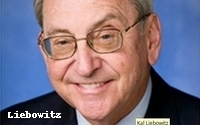 Kal Liebowitz, founder of bankrupt media agency KSL, filed for personal bankruptcy
in October with what he claimed were liabilities totaling close to $5 million.
Kal Liebowitz, founder of bankrupt media agency KSL, filed for personal bankruptcy
in October with what he claimed were liabilities totaling close to $5 million.
But that total could get a lot bigger. Liebowitz has just been sued for a minimum of $6 million by
the trustee handling the KSL wind-down, David Gottlieb. Gottlieb also sued Harold “Hank” Cohen, the former KSL CEO and Russell Meisels, its former CFO, for a minimum of $6 million each.
The suit said those numbers could grow, based on the evidence that Gottlieb is gathering.
The suit, filed as a complaint within the ongoing KSL Chapter 7 proceeding, charges
all three executives with gross negligence and breach of their fiduciary duties while running the media shop, which filed for bankruptcy in September 2013. All three executives resigned from the
company shortly before the filing.
advertisement
advertisement
The suit alleges that KSL was insolvent for years before its bankruptcy filing last year and that since at least 2006, the firm’s survival
depended on its use of pre-paid ad dollars from clients to fund expenses and operating losses. It was a tactic KSL could utilize because the firm demanded that clients pay for media once a media plan
was agreed to, while there was often months long delay between those client prepayments and the dates payments became due to media vendors.
Gottlieb alleged all three executives knew
what was going on. He cited a letter from a forensic accountant who examined the company’s 2010 books. The accountant, Donald Crandall, reported to Meisels that KSL was “deeply in debt and
technically insolvent,” and that “it appears that KSL Media has used cash flow from client prepayments to fund operations and operating losses.” The firm’s management,
concluded Crandall, “should seek professional legal advice in connection with this breach.”
According to Gottlieb, the advice essentially fell on deaf ears.
“In gross breach of his duty of care, Meisels did not insist upon or undertake a reconstruction of KSL’s financial history to determine its viability as business enterprise, nor
undertake reasonably adequate measures to control costs, create a viable budget, or undertake other corrective actions to decrease losses to KSL and its creditors.”
Meisels allegedly passed the report on to Cohen and Liebowitz, who according to Gottlieb, also took no action.
“By reason of the ongoing gross negligence of
Liebowitz, Cohen and Meisels,” the suit contends, “KSL, and its creditors, were damaged in a sum equal to the increasing losses incurred over the course of its continued operation and the
costs and expenses incurred by reason of same.”
When KSL filed for bankruptcy last year, Gottlieb said, its assets totaled approximately $34 million with an additional $20
million in net accounts receivable. Liabilities totaled approximately $85 million.
Gottlieb devotes a portion of his complaint outlining how Cohen allegedly bungled a shift in the
company’s compensation structure from a commission model to a “cost-plus” retainer model by failing to implement processes, technology, and necessary employment training programs. As
a result, employee hours dedicated to specific clients were not properly tracked, “thereby creating uncorrected operational losses.”
Former KSL controller Geoffrey
Charness, who the firm alleges stole an undetermined amount from it during his tenure from 2006 to 2010, is not charged in the suit. He is cited as an example of how upper management failed in their
stewardship responsibilities.
“Through grossly negligent and lack of attention, Liebowitz authorized issuance of an American Express card to Charness affording Charness, but
not KSL, access to membership ‘points’ which...given the volume of credit-card charges made by Charness, resulted in the issuance of no less than 180 million points to Charness, reasonably
valued at $900,000.”
The suit also takes Liebowitz, Cohen and Meisels to task for failing after Charness’ termination in 2010 to take steps to determine exactly how much
he allegedly stole or to implement proper financial safeguards and controls over accounting personnel and systems.
Gottlieb cites statements by Cohen in 2011 lamenting the lack of
any “action plan” to implement proper financial controls. “Shame on us and our head of finance for not insisting on a policy to protect the owners!” Cohen is quoted as saying
in the suit.
If there was any concern about client protection on the part of three KSL managers, it wasn’t mentioned in Gottlieb’s complaint.